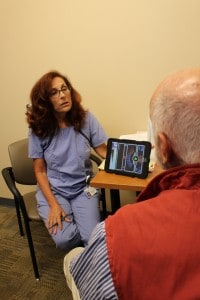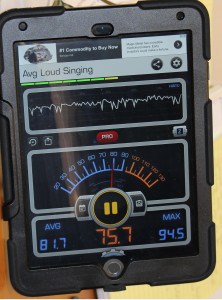Therapy is essential for patients diagnosed with Parkinson’s disease. Physical therapy can improve walking. Occupational therapy helps with activities of daily living like getting dressed and eating.
But when is it time to consult a speech therapist? Speech-language pathologist Johnna Johnson has the answer.

Speech-language pathologist Johnna Johnson uses the Lee Silverman Voice LOUD program to help Parkinson’s patients find their voice.
“When you can no longer understand or hear your family member who suffers from Parkinson’s disease because their voice has become so soft, it’s time to see a speech therapist who is certified in the Lee Silverman Voice Treatment LOUD program,” she said.
Johnson said trouble swallowing is another red flag that should lead you to therapy.
“If you start choking every time you drink or eat, it’s time to see a speech-language pathologist to address what’s weakening or what’s going on,” she said.
Parkinson’s disease damages nerves in the brain and body. It also weakens the muscles required for speech. That can cause several problems:
- A soft, breathy or hoarse voice
- “Cluttering,” or rapid, stammering speech
- Slurred speech
Johnson utilizes LSVT LOUD at Regional One Health’s East Campus Center for Rehabilitative Medicine. The program is designed specifically for patients with Parkinson’s and similar disorders. That means it’s vital to find a therapist like Johnson who is certified.
Johnson said LSVT LOUD is a very intensive program. For the first month patients work with a therapist four days a week for an hour at a time. Later they have regular follow-up visits every three months. They also must do homework to help improve and maintain their speech.
It’s hard work, but evidence shows it works. “Research shows it is 85 percent successful if the protocol is followed correctly,” Johnson said.
LSVT LOUD works in several ways:
- It strengthens the muscles involved in speech through a range of exercises.
- It trains patients to speak at a normal volume. Parkinson’s causes “feedback mismatch” that makes patients feel like they’re shouting. Johnson shows them the difference between perception and reality by playing recordings of their own voice.
- It can improve pace. “When you speak louder, you naturally speak more slowly as well,” Johnson said.
Johnson said the muscle strength improvements even help with swallowing. LSVT LOUD is also shown to improve articulation and facial expression.
LSVT LOUD is good for several conditions besides Parkinson’s:
- Multiple sclerosis
- Cerebral palsy
- Down syndrome
- Stroke
Johnson said patients don’t have to stay silent if they’re struggling with speech. A trained speech-pathologist can help. “Even if you’re asking them, ‘What did you say?’ all day long because you can’t hear them, there’s hope,” she said.
